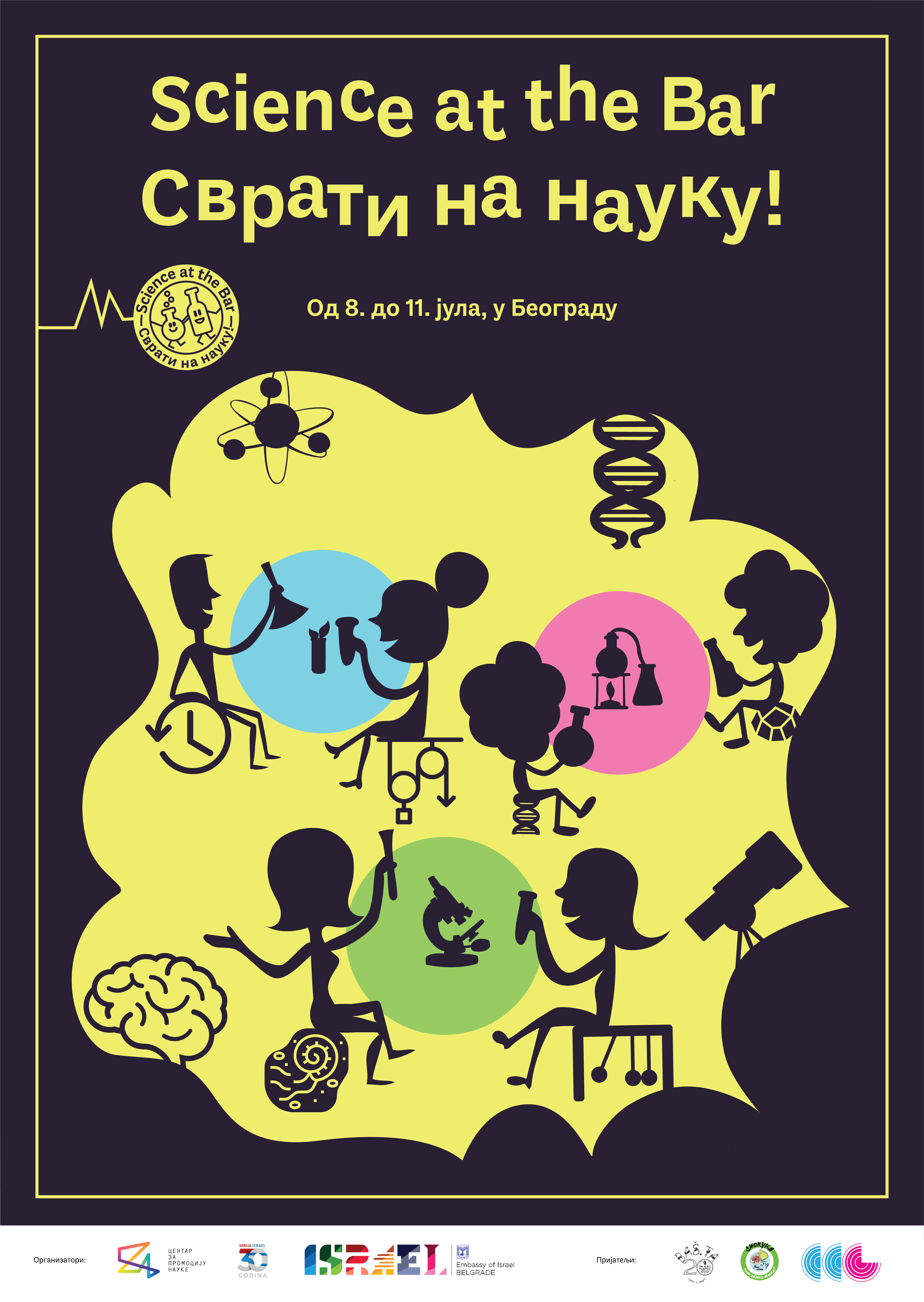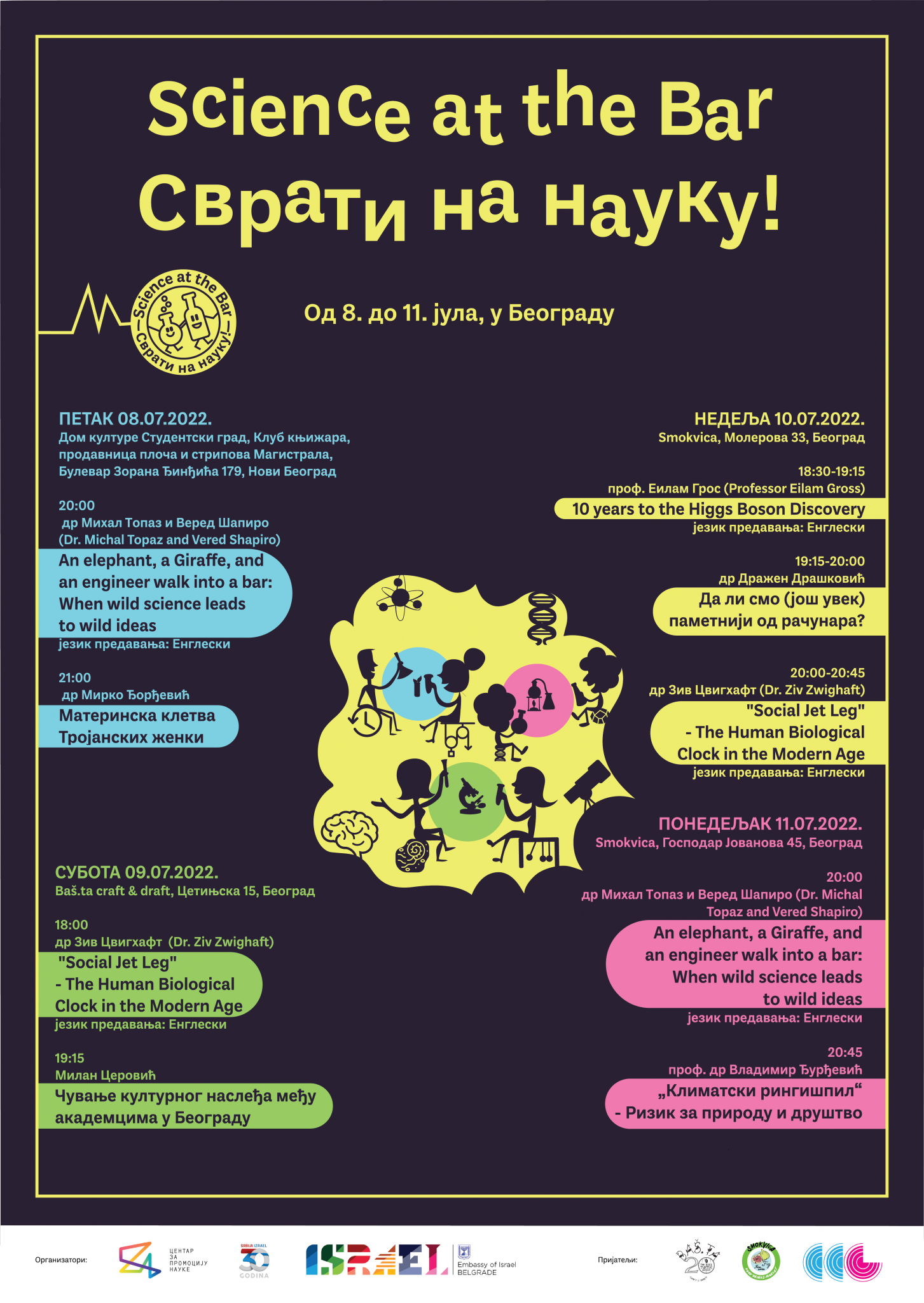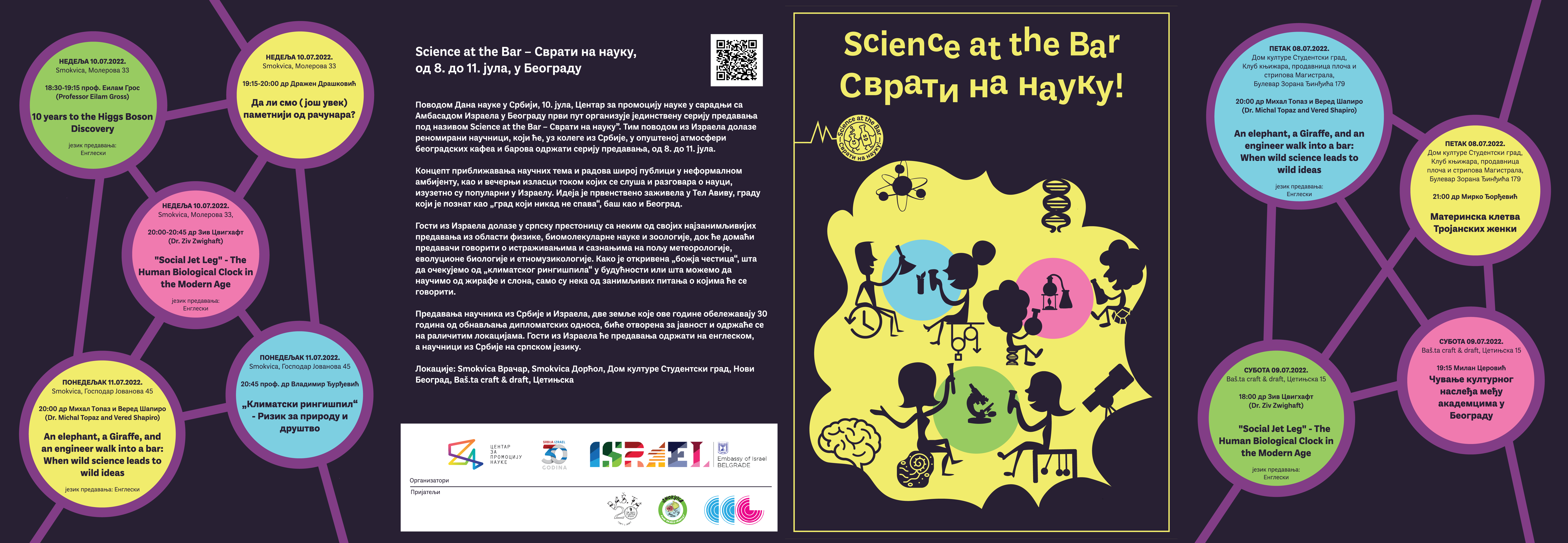The concept of bringing scientific topics and works closer to a wide audience in an informal setting, as well as evening nights out during which science is listened to and discussed, are extremely popular in Israel. The idea primarily came to life in Tel Aviv, a city known as "a city that never sleeps", just like Belgrade.
Lectures by scientists from Serbia and Israel, two countries marking this year the 30th anniversary of the diplomatic relations establishment, will be open to the public and will be held at various locations. Guests from Israel will give lectures in English, scientists from Serbia in Serbian.
Locations: Smokvica Vračar, Smokvica Dorćol, Dom kulture Studentski grad, New Belgrade, Baš.ta craft & draft, Cetinjska
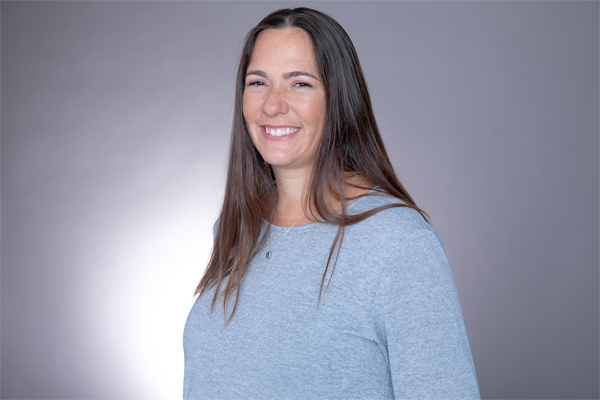
Dr. Michal Topaz is an environmental and nature conservation education specialist in The Davidson Institute of Science Education, the educational arm of the Weizmann Institute of Science. She holds a PhD in environmental education from the Technion – Israel Institute of Technology. Her research focused on bioinspiration education at the zoo as an inspiring lifelong science and environmental, informal, and interdisciplinary learning. During her research, Michal established a full bioinspiration educational unit at the Zoological Center in Ramat Gan.
As part of her work at The Davidson institute, Michal is running the educational side of a plant microbiome citizen science project, in collaboration with scientists from the Weizmann institute. She also develops environmental orientated courses for Arab and Jewish students, learning together in coexistence and serves as part of the team re-designing the Davidson “Clore Garden of Science” outdoor science museum.
Michal gives lectures at conferences and conducts outdoor activities about bioinspiration and biodiversity conservation.
An elephant, a Giraffe, and an engineer walk into a bar: When wild science leads to wild ideas
Ever thought what would you do if you had an elephant’s trunk? If you could navigate using echolocation like bats or lift heavy weight just like ants? Nature provides us with brilliant Ideas that can be used to solve human challenges with sustainable designs. This method is called bioinspiration (or: biomimicry). An interdisciplinary approach comparing biological challenges to engineering problems and natural adaptations into design solutions.
In an active lecture Vered and Michal from the Davidson Institute of Science Education, will use biomimetic thinking, and natural adaptations to solve some of the hardest challenges in… the bar! Answer questions like how can elephants help us cool beer faster? Why do you really need a trunk? And do giraffes have liquid issues? And also, ask do animals tend to get drunk?
Duration: 30 min + Q&A
Language: English
Lеcture is an active lecture with live demonstration.

Vered Shapiro specializes in developing science education and communication programs. She earned her BSc in ecology and MSc in environmental engineering from Ben-Gurion University of the Negev. For the latter degree, she studied the physical and chemical aspects of water desalination processes. She continued to conduct research related to water desalination for several years before turning to science education.
Since joining the Davidson Institute in 2012, Vered she has been developing unique interdisciplinary courses and teaching materials that introduce students to the connections between a wide range of scientific fields—from ecology and evolution, to physics and astronomy, to the history of science. As part of her work, she collaborates with science teachers and helps them to implement the courses developed at the Davidson Institute, a dynamic process that allows for these courses to continuously evolve and improve.
Vered appears regularly on educational TV and radio shows, introducing science to Israeli children; she also writes science-related articles for the mainstream media, and gives lectures on evolution and natural history at popular scientific events.
An elephant, a Giraffe, and an engineer walk into a bar: When wild science leads to wild ideas
Ever thought what would you do if you had an elephant’s trunk? If you could navigate using echolocation like bats or lift heavy weight just like ants? Nature provides us with brilliant Ideas that can be used to solve human challenges with sustainable designs. This method is called bioinspiration (or: biomimicry). An interdisciplinary approach comparing biological challenges to engineering problems and natural adaptations into design solutions.
In an active lecture Vered and Michal from the Davidson Institute of Science Education, will use biomimetic thinking, and natural adaptations to solve some of the hardest challenges in… the bar! Answer questions like how can elephants help us cool beer faster? Why do you really need a trunk? And do giraffes have liquid issues? And also, ask do animals tend to get drunk?
Duration: 30 min + Q&A
Language: English
Lеcture is an active lecture with live demonstration.

Mirko Djordjevic is an evolutionary biologists that works as a research associate at the Institute for Biological Research “Siniša Stanković”, National Institute of the Republic of Serbia, University of Belgrade. His research interest covers coevolution of the two genomes – mitochondrial and nuclear, and their role in ageing of seed beetles. Mirko is one of the coauthors of science popularization exhibition “ZooBrainology” (http://zoomozgologija.com/) and the PI of the citizen science project “Opasulji se” (https://www.opasuljise.rs/en/).
Mother’s curse of Trojan females
You might remember the mitochondria from biology class as the engine that produces the energy that cells need to function. Mitochondria are very interesting organelles because they have their own DNA (mtDNA), separate from those in the cell nucleus (nDNA). Additionally, unlike the nDNA, mitochondrial DNA is passed down exclusively via the female line. Uniparental inheritance of mtDNA makes selection blind to mutations with negative effects to males. In other words, natural selection will not recognize any mtDNA mutation which is male harming but neutral or beneficial in their effects on females. Evolutionary theory predicts that male-biased mtDNA mutations will evade selection and accumulate within mtDNA sequence. This phenomena has been known as the Mother’s curse hypothesis and the focus of Mirko’s research is the use of this “evolutionary trap” in the development of innovative biocontrol of pest insects named Trojan female technique.
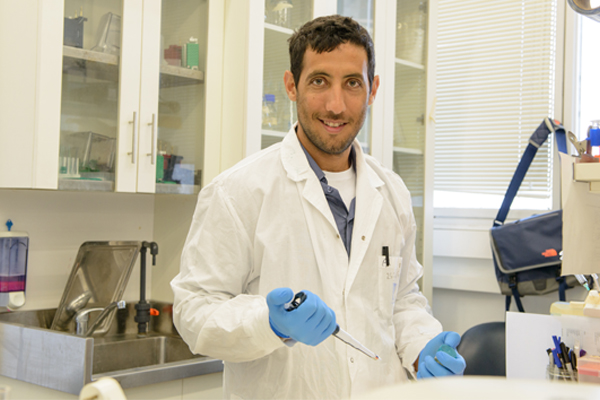
Ziv Zwighaft holds a PhD in Bio-molecular Sciences and a position at the Weizmann Institute of Science, where he researches the biological clock in mammals and the relationship between metabolism, aging and the biological clock. He is a passionate public speaker and founder & CEO of a biotech start-up Ambrosia Bio. In addition to his scientific work, he is one of the leading endurance athletes in Israel and broad.
“Social Jet-Lag” – The Human Biological Clock in the Modern Age
In his lecture, Ziv will help us understand better the connection between the biological clock and our health, as well as the ability to make decisions. The issue that concerns us all is what is the impact of the modern lifestyle, of endless hours in the office? Moreover, what can we do to reduce and minimize the ongoing damage? The audience will become familiar with our internal time measurement apparatus (the circadian clock) and better know their chronotype afterward.
Ziv will also share some tips: When is the best time to go to see a dentist to feel the least amount of pain? What we could do to become better athletes and most importantly to age better? What is more “dangerous”, to eat a hamburger in the morning or the same dish at night? Why on the one hand, babies do not sleep well at night and on the other adolescents fail to wake up in the morning? When is the best time of the day to engage in a physical activity? When to make love?
Duration: 30 min + Q&A
Language: English

My name is Lana Đuričković, I am 20 years old and I graduated from the “Slobodan Škerović” Gymnasium in Podgorica. I started my studies at the Faculty of Philology in Nikšić, Department of Italian Language and Literature, and then continued them at the Faculty of Philology of the University of Belgrade. For six years I was a member of the theater ensemble “Dodest” in Podgorica. Since 2021, I have been a member of the ensemble of the “Branko Krsmanović” Academic Theater in Belgrade. I am the winner of the “Mileva Žikić” award for an actress, for the role of Sara in the play “I have no one anywhere” by Edvard Bond. In Podgorica, I trained in the Japanese martial art of swordsmanship – Kendo. I am the holder of seven medals in this skill at the national level, as well as a bronze medal at the Balkan competition in 2017. In the organization of the volunteer club of the Red Cross of Montenegro, I attended various trainings and thus acquired the titles of first aid instructor, lecturer on the fight against human trafficking, motivator of voluntary blood donation and injury make-up artist at training grounds and competitions in providing first aid.
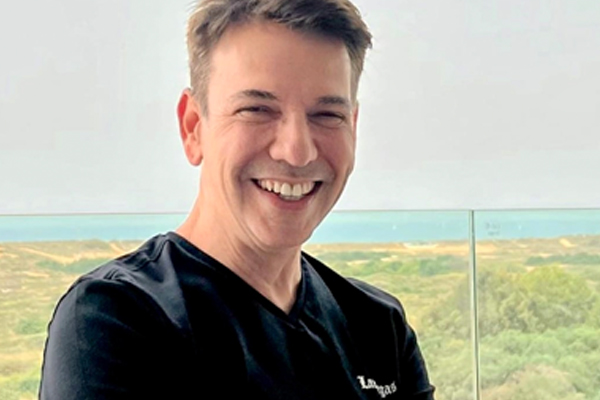
Prof. Eilam Gross Lecture Title: 10 years to the Higgs Boson Discovery
In July 2012 CERN announced the discovery of the Higgs Boson after its prediction almost 50 years prior to its discovery. The Higgs Boson is responsible for the generation of Masses in the universe and its discovery cannot be overestimated.
We will tell the inside story of one of the biggest discoveries made by mankind ever. Mr. Gross was born in Tel Aviv. After completing his army service in an elite communications unit, he left for New York to study music. There he came across a cult book, The Tao of Physics, which prompted him to come back to Israel and study physics at the Hebrew University of Jerusalem. His master’s thesis at the Weizmann Institute was written on string theory, after which he “deserted” theoretical work for experimental high-energy physics. In the last twenty years, Professor Gross has devoted his scientific career to the search for the Higgs particle and its discovery.
He was ATLAS statistical data analysis forum convener where he took a major part in developing the statistical methods used for search and discovery.
He was then ATLAS Higgs convener at the time of the discovery of the Higgs Boson.

Dr. Drazen Draškovic is an assistant professor at the Faculty of Electrical Engineering, University of Belgrade, where he completed his diploma, master’s and doctoral studies. During his studies, he did two professional internships at the companies IBM and Google. The field of his research includes the application of artificial intelligence in software systems, data analysis and processing, as well as the design and testing of modern software. He participated as a software architect and engineer in several international projects at international institutions (UNOPS, WHO, UNDP), and is currently involved in 2 large international projects in the field of artificial intelligence and analysis of large databases. In his ten-year career, he implemented more than 100 different software applications, held over 50 professional trainings and workshops in IT companies and 60 lectures at conferences. The motto of Drazen’s work is that quality education is a sure way to the future.
Are we (still) smarter than computers?

Dr Vladimir Djurdjevic is an associate professor of meteorology at the Faculty of Physics, University of Belgrade, Serbia. During his career, he was also a visiting scientist at the NOAA (USA) and CMCC (Italy). His expertise is in the field of climate modeling, climate data analysis, climate impacts, vulnerability and adaptation to climate change. Beside his career in education and science he regularly participating in different public events dedicated to the problem of climate change.
“Climate carousel” – Risk for nature and society
The Earth’s climate system has been undergoing rapid transformation for decades, primarily due to uncontrolled anthropogenic greenhouse gas emissions. Since the end of the nineteenth century, the mean global temperature has risen by 1 ° C, causing a number of other changes in other elements of the climate system. These changes are already putting pressure on the functioning of modern society, but also the natural systems on Earth. If anthropogenic emissions continue to follow the trends of the past in the future, we can expect these changes to continue, and the negative consequences will increase significantly, opening many questions about what the future society will look like, but also to what extent the living world will be able to adapt to these changes.
Duration: 30 min + Q&A
Language: English
